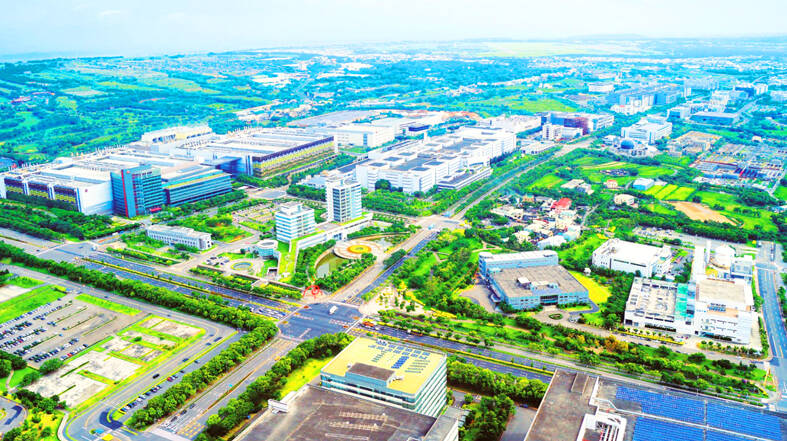The Ministry of the Interior yesterday approved a development project to expand the Central Taiwan Science Park (中部科學園區), paving the way for Taiwan Semiconductor Manufacturing Co (TSMC, 台積電) to build an advanced 1.4-nanometer fab next year.
The project is crucial for the nation’s semiconductor industry in terms of next-generation technology and capacity, the Central Taiwan Science Park Bureau said in a statement.
The bureau expects to hand over the land to interested semiconductor companies by the end of June next year, when the Taichung City Government completes land appropriation.

Photo courtesy of the Central Taiwan Science Park Bureau via CNA
Taichung Mayor Lu Shiow-yen (盧秀燕) earlier this month told reporters that TSMC had agreed to build an advanced fab, likely using 1.4-nanometer technology, in the expanded Central Taiwan Science Park after the chipmaker suffered a setback in October in building an advanced fab in the Longtan (龍潭) section of Hsinchu Science Park (新竹科學園區) due to strong opposition by local residents.
The bureau said that a majority, or about 76 percent, of the 89.75 hectares to be appropriated is owned by a golf course operator, adding that the central and local governments would work together to solve issues concerning the golf course employees and compensation to members.
Government agencies, including the Ministry of National Defense, own about 13 percent of the land, the bureau said.
If the new project moves forward smoothly, it would generate NT$485.7 billion (US$15.6 billion) in annual production value and create 4,500 jobs upon completion, the bureau said.
Several companies from the semiconductor supply chain have expressed an interest in building operations there, it said.
Separately, MediaTek Inc (聯發科) yesterday said it would work closely with TSMC to produce its new flagship smartphone chips using 3-nanometer technology next year.
“Leading-edge technologies are very complicated and it is difficult for the company to switch [foundry] partners,” MediaTek chief executive officer Rick Tsai (蔡力行) told reporters when asked if the smartphone chip designer is considering a second source, such as Intel Corp or Samsung Electronics Co.
MediaTek has been working with Intel to produce chips using the latter’s 16-nanometer technology, Tsai said.

TAKING STOCK: A Taiwanese cookware firm in Vietnam urged customers to assess inventory or place orders early so shipments can reach the US while tariffs are paused Taiwanese businesses in Vietnam are exploring alternatives after the White House imposed a 46 percent import duty on Vietnamese goods, following US President Donald Trump’s announcement of “reciprocal” tariffs on the US’ trading partners. Lo Shih-liang (羅世良), chairman of Brico Industry Co (裕茂工業), a Taiwanese company that manufactures cast iron cookware and stove components in Vietnam, said that more than 40 percent of his business was tied to the US market, describing the constant US policy shifts as an emotional roller coaster. “I work during the day and stay up all night watching the news. I’ve been following US news until 3am

UNCERTAINTY: Innolux activated a stringent supply chain management mechanism, as it did during the COVID-19 pandemic, to ensure optimal inventory levels for customers Flat-panel display makers AUO Corp (友達) and Innolux Corp (群創) yesterday said that about 12 to 20 percent of their display business is at risk of potential US tariffs and that they would relocate production or shipment destinations to mitigate the levies’ effects. US tariffs would have a direct impact of US$200 million on AUO’s revenue, company chairman Paul Peng (彭雙浪) told reporters on the sidelines of the Touch Taiwan trade show in Taipei yesterday. That would make up about 12 percent of the company’s overall revenue. To cope with the tariff uncertainty, AUO plans to allocate its production to manufacturing facilities in

Six years ago, LVMH’s billionaire CEO Bernard Arnault and US President Donald Trump cut the blue ribbon on a factory in rural Texas that would make designer handbags for Louis Vuitton, one of the world’s best-known luxury brands. However, since the high-profile opening, the factory has faced a host of problems limiting production, 11 former Louis Vuitton employees said. The site has consistently ranked among the worst-performing for Louis Vuitton globally, “significantly” underperforming other facilities, said three former Louis Vuitton workers and a senior industry source, who cited internal rankings shared with staff. The plant’s problems — which have not

TARIFF CONCERNS: The chipmaker cited global uncertainty from US tariffs and a weakening economic outlook, but said its Singapore expansion remains on track Vanguard International Semiconductor Corp (世界先進), a foundry service provider specializing in producing power management and display driver chips, yesterday withdrew its full-year revenue projection of moderate growth for this year, as escalating US tariff tensions raised uncertainty and concern about a potential economic recession. The Hsinchu-based chipmaker in February said revenues this year would grow mildly from last year based on improving supply chain inventory levels and market demand. At the time, it also anticipated gradual quarter revenue growth. However, the US’ sweeping tariff policy has upended the industry’s supply chains and weakened economic prospects for the world economy, it said. “Now